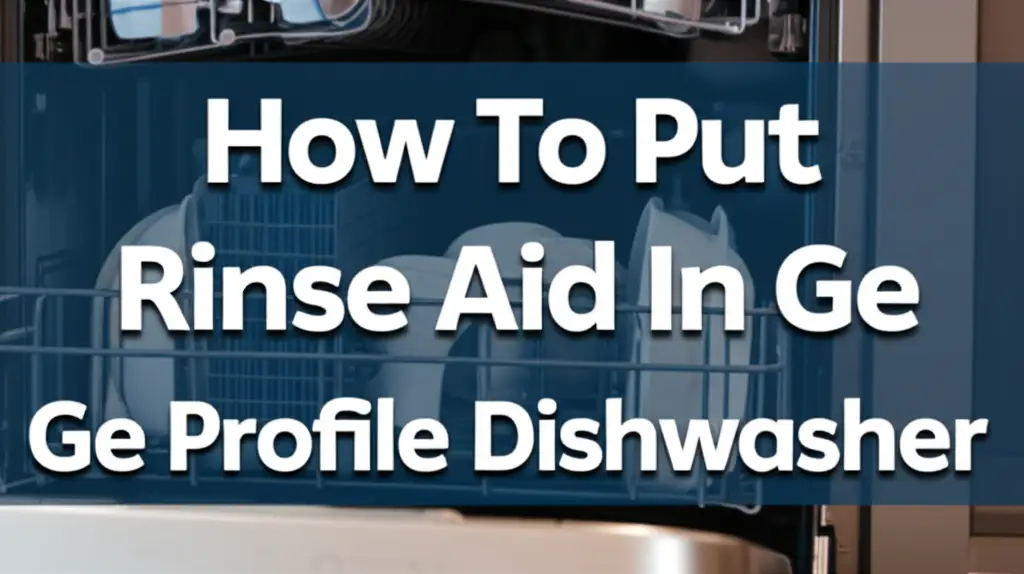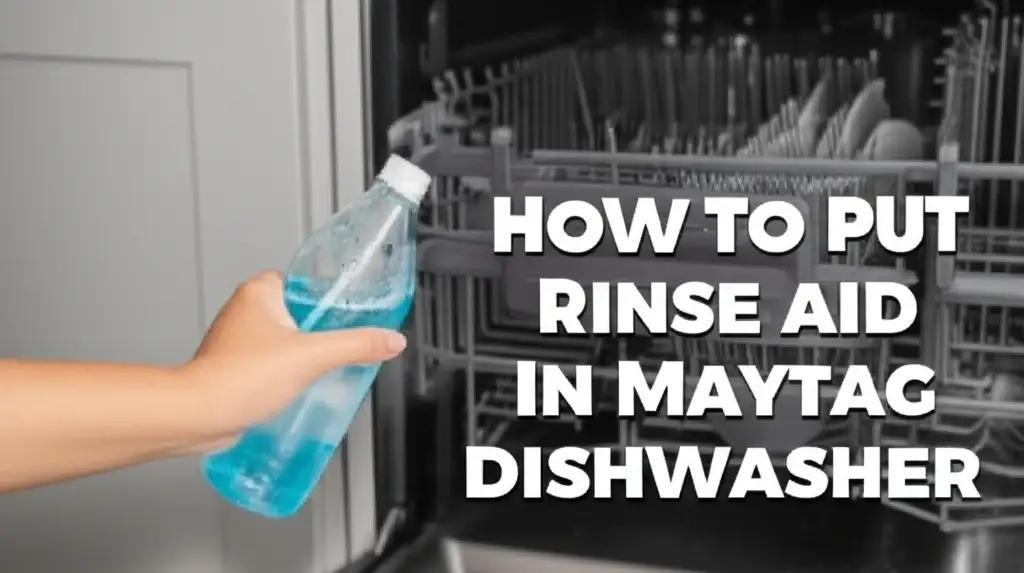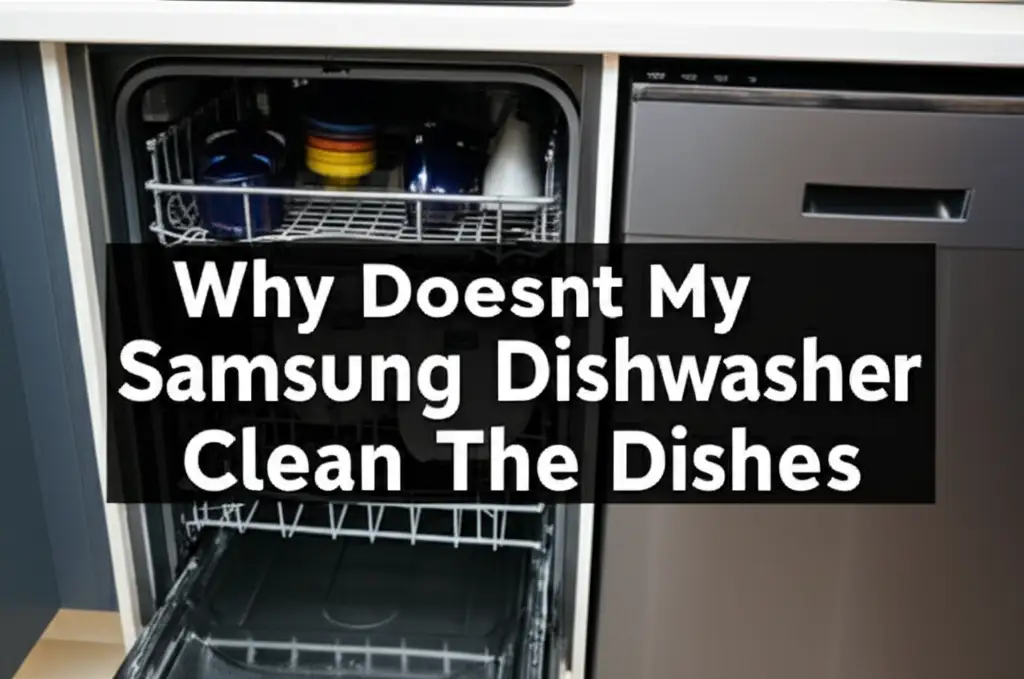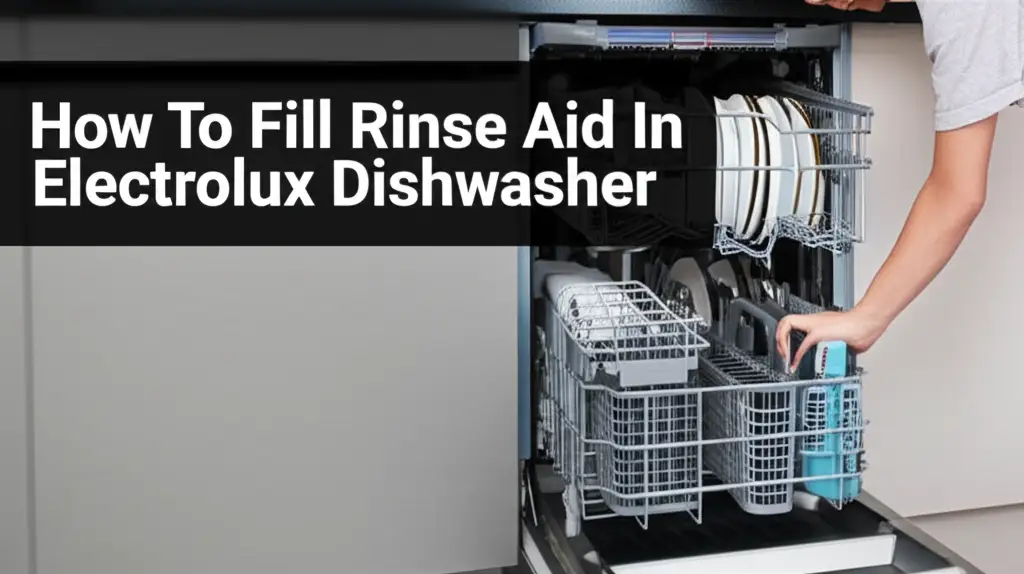· Katria Melrose · Home Appliances · 15 min read
Why Is My Bosch Dishwasher Using Lots Of Rinse Aid
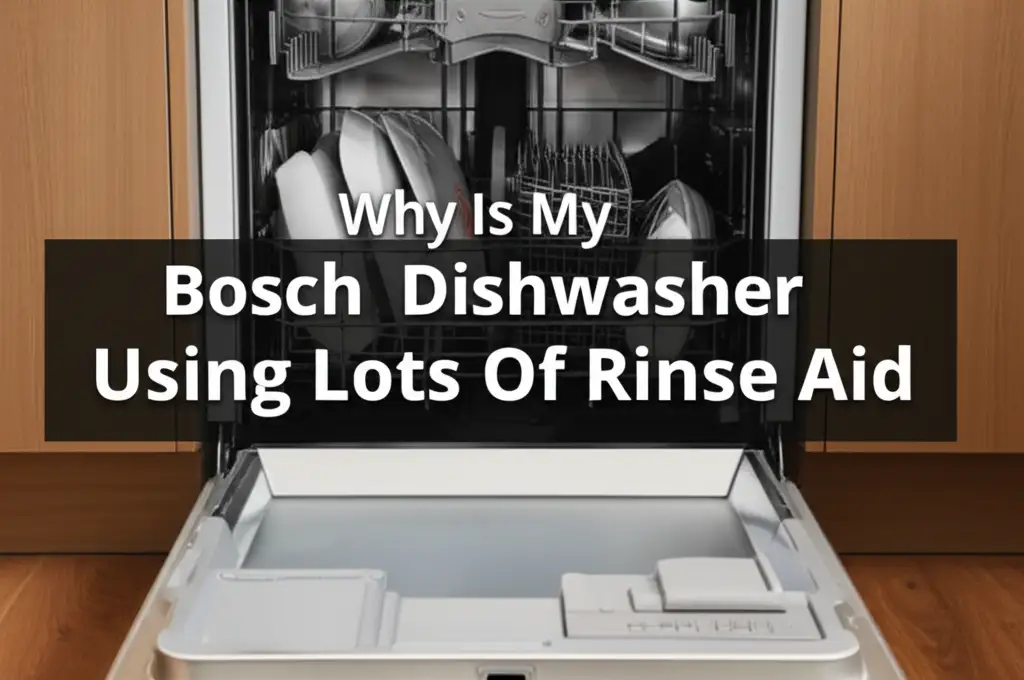
Why Is My Bosch Dishwasher Consuming Too Much Rinse Aid?
You recently filled your Bosch dishwasher with rinse aid. Now, the indicator light is on again. You might wonder, “Why is my Bosch dishwasher using lots of rinse aid?” This common issue can lead to cloudy dishes, streaky glassware, or simply a faster depletion of your rinse aid supply. Understanding the reasons behind excessive rinse aid use helps you fix the problem. This guide explores common culprits from incorrect settings to maintenance needs. We offer practical steps to restore your dishwasher’s efficiency. Let us dive into the world of proper dish care.
Takeaway:
- Adjust Rinse Aid Settings: Check and lower the rinse aid dosage level in your Bosch dishwasher’s settings. This is the most frequent cause.
- Evaluate Water Hardness: Hard water often requires more rinse aid. Consider a water softener if your water is very hard.
- Inspect the Dispenser: Look for clogs or leaks in the rinse aid dispenser. Ensure the cap seals tightly.
- Use Proper Detergent: Ensure you use a high-quality detergent. Using too little or too much can affect rinse aid needs.
- Clean Your Dishwasher: Regular cleaning prevents residue buildup. Buildup affects drying and rinse aid distribution.
A Bosch dishwasher uses lots of rinse aid most often due to incorrect dispenser settings. It can also be caused by very hard water, a faulty dispenser, or using the wrong type of detergent. Adjusting settings and basic checks usually fix the problem.
Understanding Rinse Aid’s Role in Dishwashing
Rinse aid is a crucial component for clear, spot-free dishes. It is a surfactant. This means it reduces the surface tension of water. When water has lower surface tension, it sheets off dishes more easily. This action prevents water droplets from drying and leaving spots or streaks. Bosch dishwashers use rinse aid to improve drying performance. They also ensure a sparkling finish, especially on glassware.
Without enough rinse aid, water can cling to surfaces. This leads to mineral deposits forming as the water dries. These deposits show as white spots or cloudy film. Rinse aid allows water to run off, taking dissolved minerals with it. This process leaves dishes cleaner and helps them dry faster. It is important to know how rinse aid works to understand why your Bosch dishwasher might consume too much. An optimal rinse aid level means spotless dishes without wasting product.
Checking and Adjusting Rinse Aid Settings
One of the most common reasons a Bosch dishwasher uses lots of rinse aid is an incorrect setting. Bosch dishwashers have adjustable rinse aid dosage levels. These settings control how much rinse aid the machine releases during the rinse cycle. If this setting is too high, your dishwasher will use more rinse aid than necessary. You might notice excessive suds or a sticky film on dishes.
I remember my own Bosch dishwasher suddenly guzzling rinse aid. The first thing I checked was the settings. This step is often overlooked. Most Bosch models allow you to adjust the dispense amount. You can find this setting in your dishwasher’s menu. Look for options related to “rinse aid” or “drying.” The owner’s manual provides exact instructions for your specific model. Reducing the dosage can often solve the problem immediately. Start by lowering it one level at a time. Then, run a few cycles to observe the results.
Accessing Rinse Aid Settings on Your Bosch
Accessing rinse aid settings varies slightly by Bosch model. Generally, you need to enter a programming mode. This mode is often activated by holding down a specific button. Common buttons include “Start” or “Power Scrub Plus.” After entering the mode, indicator lights usually show the current rinse aid level. You can then use other buttons, like “Cycle” or “Options,” to change the setting.
The setting typically ranges from 0 to 6. A setting of 0 means no rinse aid dispenses. A higher number means more rinse aid dispenses. Most homes find a setting between 3 and 5 works well. If your dishes are coming out clean but still have spots, you might need a bit more. If they feel slippery or have residue, you are probably using too much. Adjusting this setting is a simple yet powerful way to control rinse aid consumption.
The Impact of Water Hardness on Rinse Aid Consumption
Water hardness significantly affects how much rinse aid your dishwasher needs. Hard water contains high levels of dissolved minerals. These minerals include calcium and magnesium. When hard water dries on dishes, it leaves behind unsightly spots and film. Rinse aid helps to combat these mineral deposits. If your home has very hard water, your Bosch dishwasher may naturally use more rinse aid to achieve spotless results.
My own experience with hard water taught me this. I live in an area with hard water. I noticed my dishwasher always seemed to need more rinse aid than my friend’s. I learned that the machine compensates for the minerals. It works harder to ensure proper sheeting. If you do not know your water hardness, you can buy a test kit. Many home improvement stores sell these kits. Some water utility companies also provide this information.
Adjusting for Hard Water Conditions
Once you know your water hardness, you can adjust your dishwasher’s rinse aid setting more precisely. Some Bosch models have a water softener system built-in. This system helps reduce the mineral content of the water entering the dishwasher. If your model has this feature, ensure it is set correctly for your water hardness. Consult your owner’s manual for specific instructions on adjusting the water softener.
Even without a built-in softener, understanding your water hardness helps. You might need to use a slightly higher rinse aid setting for hard water. However, if your Bosch dishwasher uses lots of rinse aid, it might still be too much. You may also consider adding a whole-house water softener. This offers a long-term solution for all your water-using appliances. For alternatives, some users consider options like Can I use vinegar instead of rinse aid in dishwasher if hard water is a consistent issue.
Investigating Rinse Aid Dispenser Issues
A malfunctioning rinse aid dispenser can cause your Bosch dishwasher to use too much rinse aid. The dispenser is a small compartment. It is usually located near the detergent dispenser. It holds the liquid rinse aid. Problems can range from simple clogs to more complex internal leaks. If the dispenser is not working correctly, it might release too much rinse aid. It might also release it at the wrong time during the cycle.
I once found a sticky residue inside my dispenser. It was causing the cap to not seal properly. This led to rinse aid slowly leaking out. Always check the dispenser visually. Look for any cracks or signs of wear. Ensure the cap screws on tightly. A loose or damaged cap allows rinse aid to escape. This means it depletes faster than it should.
Common Dispenser Problems and Solutions
- Clogged Dispenser: Sometimes, rinse aid can dry or become gummy. This clogs the dispenser’s opening. This blockage prevents proper release. It can also cause the dispenser to hold excess amounts, then suddenly dump it.
- Solution: Clean the dispenser opening. Use a small brush or a toothpick. Warm water and a cloth can wipe away residue. Ensure the tiny opening where rinse aid dispenses is clear.
- Leaking Dispenser: A crack in the dispenser reservoir can cause leaks. This leak will waste rinse aid quickly. The rinse aid might drip into the tub even when the dishwasher is off.
- Solution: Inspect the dispenser for visible damage. If you see cracks, the dispenser may need replacement. This often requires a service technician.
- Faulty Dispenser Mechanism: The internal mechanism that controls rinse aid release can fail. This failure might cause it to always stay open. It could also dispense continuously.
- Solution: This issue typically requires replacing the rinse aid dispenser assembly. This is a more complex repair. It usually needs professional help. A common question I’ve heard from others dealing with similar issues is Why does my Bosch dishwasher use so much rinse aid, which points to these dispenser problems as key culprits.
The Role of Detergent in Rinse Aid Consumption
The type and amount of detergent you use can indirectly affect rinse aid consumption. Some detergents contain rinse aid built-in. If you use one of these “all-in-one” detergent pods or tablets, you might not need to add separate liquid rinse aid. Your Bosch dishwasher may still be set to dispense rinse aid, even if your detergent already includes it. This leads to overuse.
I often recommend using detergents specifically designed for automatic dishwashers. For instance, knowing What detergent is recommended for Bosch dishwasher can guide you to optimal choices. Using too much powdered detergent can also create excessive suds. These suds can interfere with the rinse cycle. The dishwasher may try to compensate by dispensing more rinse aid to combat the suds. Using too little detergent might lead to poorly cleaned dishes. This could also prompt you to mistakenly increase rinse aid thinking it will improve cleanliness.
Optimal Detergent Use for Bosch Dishwashers
- Check Detergent Type:
- If using an all-in-one tablet (e.g., Finish Quantum, Cascade Platinum), check its packaging. It often states “with rinse aid” or “powerball.”
- If your detergent already contains rinse aid, consider setting your dishwasher’s rinse aid dispenser to a lower setting, or even off.
- Detergent Dosage:
- Always follow the detergent manufacturer’s recommendations. The amount depends on water hardness and load size.
- Do not overfill the detergent dispenser. This creates too many suds.
- Underfilling might mean dishes are not clean. This can trick your dishwasher into working harder or dispensing more rinse aid.
- Detergent Freshness:
- Detergent can lose effectiveness over time, especially if exposed to moisture.
- Store detergent in a cool, dry place. Replace old or clumped detergent. Fresh detergent cleans better. This can reduce the need for excessive rinse aid.
Using the right amount of a good quality detergent is a simple way to help your Bosch dishwasher optimize rinse aid use.
Loading Practices and Dishware Types
How you load your Bosch dishwasher affects its cleaning and drying performance. Improper loading can make dishes not dry well. This might trick the dishwasher into thinking it needs more rinse aid. Water might pool in crevices or on inverted cups. When this water dries, it leaves spots. You might then increase rinse aid. However, the real problem is the loading method. For tips on proper loading, consider resources like How to load Bosch silence plus dishwasher.
Dishware type also plays a role. Plastics, for example, do not hold heat as well as ceramics or glass. This means plastics dry slower. Water can cling to them more stubbornly. If your loads contain a lot of plastic items, you might notice them staying wet. This is normal. It is not necessarily a sign that your dishwasher uses lots of rinse aid unnecessarily. It is simply a property of the material.
Tips for Effective Dishwasher Loading
- Do Not Overload: Overloading blocks spray arms. Water and rinse aid cannot reach all surfaces effectively. This leads to poor cleaning and drying. Leave space between dishes.
- Face Dirty Surfaces Towards Sprays: Ensure the dirtiest parts of dishes face the water jets.
- Angle Dishes for Drainage: Place bowls and cups upside down. Angle them slightly. This allows water to run off. It prevents pooling.
- Separate Silverware: Avoid nesting spoons and forks. This ensures each piece gets clean and dries well.
- Distribute Plastics: Spread out plastic items. Do not clump them together. This helps them dry better. If they remain wet, it is due to their material.
Proper loading ensures water and rinse aid reach every surface. It promotes efficient drying. This reduces the perception that your Bosch dishwasher is using too much rinse aid for drying issues.
Regular Maintenance and Cleaning
A clean dishwasher works more efficiently. Buildup of food particles, grease, and hard water minerals can impede performance. This includes how effectively rinse aid is dispensed and distributed. If your dishwasher has internal residue, it might prevent water from sheeting off dishes properly. This can lead to spotty dishes. You might then compensate by adding more rinse aid.
I always make sure to clean my dishwasher every few months. It makes a noticeable difference. The dishwasher can develop limescale over time, especially in hard water areas. This scale affects heating elements and spray arms. It can also clog the tiny rinse aid nozzle. A clogged nozzle might release rinse aid erratically. Or it might not release enough at the right time. This causes the machine to dispense more to compensate later.
Steps for Thorough Dishwasher Cleaning
- Clean the Filter: Locate and remove the filter at the bottom of the dishwasher. Rinse it under running water. Use a brush to remove trapped food debris. This simple step vastly improves drainage and cleanliness.
- Wipe Down the Interior: Use a damp cloth to wipe the interior walls and door gasket. Pay attention to any gunk or mold around the seals.
- Run a Cleaning Cycle: Use a dishwasher cleaner tablet. Or use a cup of white vinegar on an empty hot water cycle. Place the vinegar in a dishwasher-safe bowl on the top rack. This helps remove mineral buildup and odors. For detailed instructions, you can refer to resources like How to clean Bosch dishwasher with vinegar and baking soda or How to run clean cycle on Bosch dishwasher.
- Check Spray Arms: Ensure the holes in the spray arms are clear. Food particles can clog them. Use a toothpick to clear any blockages. Clean spray arms mean better water circulation.
Regular cleaning helps your Bosch dishwasher perform at its best. This includes optimizing rinse aid usage. It ensures your dishes come out sparkling clean.
Advanced Troubleshooting and Professional Help
If you have tried adjusting settings, checking your water, and cleaning your dishwasher, but your Bosch dishwasher still uses lots of rinse aid, it might be a deeper issue. Sometimes, an internal component may be faulty. These issues are less common but can occur. They typically require more advanced troubleshooting.
It is wise to first re-check all the simple solutions. Sometimes, a setting might revert, or a new clog might form. I always re-verify simple things before thinking about a complex issue. If the problem persists, it may be time to consult a professional. Bosch dishwashers are complex machines. Their internal components are not always easy to access or diagnose for the average homeowner.
When to Seek Professional Assistance
- Consistent Leaking from Dispenser: If the dispenser consistently leaks despite cleaning, it likely needs replacement. This is a job best left to a technician.
- Error Codes: Your Bosch dishwasher might display an error code related to the dispenser or water system. Consult your owner’s manual for code meanings. Some codes indicate a sensor failure.
- Unusual Noises: Strange noises during the rinse cycle could point to a pump or valve issue. These components affect water flow and could indirectly impact rinse aid usage.
- No Improvement After All Checks: If you have diligently gone through all the steps outlined in this article and your Bosch dishwasher still uses lots of rinse aid, a hidden defect might be present. This could be a control board issue or a problem with the dispenser’s internal electronics.
A qualified appliance technician can diagnose these more complex problems. They have the tools and expertise to replace faulty parts safely. Do not attempt complex repairs yourself unless you have experience. This can void your warranty or cause further damage. Getting professional help ensures your Bosch dishwasher returns to optimal performance.
FAQ Section
How often should I refill rinse aid in my Bosch dishwasher?
The frequency depends on your rinse aid setting and water hardness. With optimal settings, you might refill every 1-2 months. If your Bosch dishwasher uses lots of rinse aid quickly, check your settings first. A higher setting or hard water means more frequent refills.
Can I use vinegar instead of rinse aid in my Bosch dishwasher?
Yes, you can use white vinegar as a natural alternative to rinse aid. Fill the rinse aid dispenser with white vinegar. This can help prevent spots and streaks. However, check your Bosch manual first. Some manufacturers advise against it due to potential seal wear over time.
Why do my dishes feel slimy after using rinse aid?
If dishes feel slimy, you are likely using too much rinse aid. Your Bosch dishwasher’s rinse aid setting is probably too high. Reduce the dosage level one step at a time. Run a few cycles to find the optimal balance. Slimy dishes mean excess rinse aid residue.
Does a Bosch dishwasher automatically detect water hardness?
Some advanced Bosch dishwasher models have a water hardness sensor. These models might adjust rinse aid dosage automatically. However, many models require manual input for water hardness or rinse aid levels. Check your specific model’s manual for details on this feature.
Can old rinse aid cause problems in my dishwasher?
Rinse aid does not typically go bad. But it can become thick or gummy if exposed to air over long periods. This can clog the dispenser. If your rinse aid seems unusually viscous, replace it. Store rinse aid bottles with caps tightly sealed.
What are the signs of too much rinse aid being used?
Signs include streaks on glassware, a sticky or greasy film on dishes, or excessive suds during the rinse cycle. You might also notice your rinse aid reservoir depleting very quickly. These are clear indicators your Bosch dishwasher uses lots of rinse aid.
Conclusion
Finding out why your Bosch dishwasher uses lots of rinse aid involves a few systematic checks. Most often, the solution is simple. Adjusting the rinse aid dosage setting is your first and most effective step. Consider your water hardness. This plays a significant role in how much rinse aid your machine needs. Inspecting the rinse aid dispenser for clogs or leaks is also crucial. Ensure you use the right type and amount of detergent. Poor loading practices can also make drying seem inefficient. Regularly cleaning your dishwasher prevents buildup that affects performance.
My own experience showed me that simple checks prevent bigger issues. If you have tried all these steps and your Bosch dishwasher continues to consume excessive rinse aid, a professional technician can help. They can diagnose and repair any internal malfunctions. By following these guidelines, you can ensure your Bosch dishwasher operates efficiently. It will deliver sparkling clean, spot-free dishes every time. Keep your appliance in top condition. Enjoy spotless results.
- Bosch Dishwasher
- Rinse Aid
- Dishwasher Maintenance
- Appliance Troubleshooting


